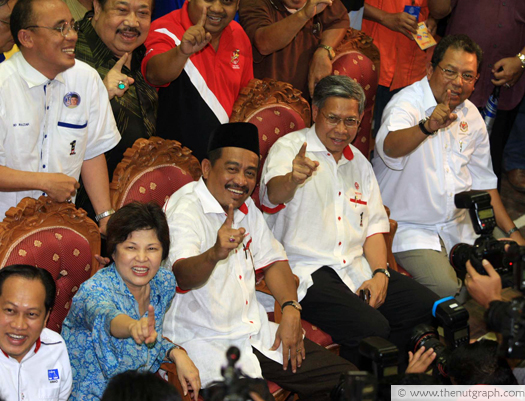
BARISAN Nasional (BN) won big in both the Batu Sapi and Galas by-elections on 4 Nov 2010. In Galas, BN beat PAS with a 1,190-vote majority and won 12 out of the 13 polling districts. PAS only managed to retain its stronghold in Sungai Terah with a reduced majority of 258 compared to 510 in 2008. The Islamist party admitted shock at its own defeat as it had expected a margin of 600 to 700 votes if it were to lose.
PAS’s original strategy was to retain Orang Asli votes at 33%, while increasing Chinese Malaysian votes to 60-70%. It was expecting a 6% drop in Malay Malaysian support similar to the Manik Urai by-election in July 2009.
As it turned out, PAS suffered a drop in all communities, with an estimated 8% among Malay Malaysians, 2-3% among Chinese Malaysians, and a whopping 13% among Orang Asli voters compared to 2008.
But beyond the numerical results, the battle for Galas, as with some of the other by-elections in rural or semi-rural areas since 2008, is the problem of disempowered voters whose decisions are still largely defined by development and economic issues. This poses Pakatan Rakyat (PR) its biggest challenge ahead of the 13th general election.
Wrong bet on Orang Asli votes
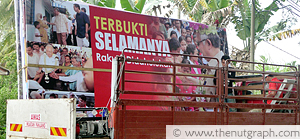
Political analyst Dr Ong Kian Ming attributes BN’s larger-than-expected victory to Orang Asli voters, who comprise 17% of constituents. BN strengthened its hold on the Orang Asli by winning all their six polling districts with increased majorities.
Ong notes that of BN’s victory margin of 1,190 votes, 1,001 came from Orang Asli while another 121 came from postal votes.
“In Malay and Chinese-dominated areas BN won with only a slim majority,” the UCSI lecturer tells The Nut Graph in a phone interview.
Indeed, PAS only received 20% of the Orang Asli votes compared to 33% in 2008. It suffered its worst defeat in Bihai and Belatim where the party only received 2% of the total vote and 7%, respectively.
| Orang Asli polling districts | BN | PAS | Majority |
| Brooke | 424 | 78 | 346 |
| Bihai | 233 | 5 | 228 |
| Sungai Ber | 257 | 99 | 158 |
| Balar | 153 | 41 | 112 |
| Belatim | 117 | 9 | 108 |
| Hau | 138 | 89 | 49 |
| Total | 1,322 | 321 | 1,001 |
(Source: Election Commission)
The Orang Asli voter turnout, at around 87%, was also higher than the overall 83% of the recent by-election.
PAS has only itself to blame for its humiliating defeat among Orang Asli voters. Despite being in power in Kelantan for 20 years, it has done little for one the most marginalised communities in its state.
On the contrary, it has been taking away Orang Asli lands for logging and plantation purposes. The state only passed a resolution to gazette Orang Asli reserves in March 2010. Its pledge to give two acres of land to each Orang Asli near the end of the campaign period failed to galvanise support among the community.
Consequently, the Orang Asli, whose livelihood and identity are strongly tied to their ancestral land, have become dependent on welfare received from the Department of Orang Asli Affairs under the BN federal government.
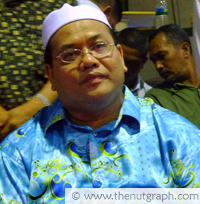
PAS’s lacklustre campaign
PAS appeared complacent in its campaign from the start of the Galas by-election. It did not go all out to win, possibly because the seat does not affect its control of the state assembly, Universiti Sains Malaysia political analyst Dr Sivamurugan Pandian suggests. PAS has 38 seats in the state assembly and PKR, one. With Galas, Umno now has seven.
PAS was also hampered by its own reluctance to raise Kelantan’s oil royalty issue so as not to offend its ally on the subject, Tengku Razaleigh Hamzah or Ku Li, who led the Galas campaign for BN, Sivamurugan adds.
Political analyst Khoo Kay Peng notes that PAS’s candidate Dr Zulkefli Mohamed was hardly fresh. Dr Zulkefli had lost twice to Ku Li when he contested against the Umno veteran for the Gua Musang parliamentary seat in 2004 and 2008.

Compared to BN candidate Abdul Aziz Yusof’s sociable nature, Dr Zulkefli lacked personal charm and appeared to be a reluctant candidate throughout the campaign.
Local trumps national
Additionally, PAS failed to effectively counter local issues such as land titles and development consistently raised by BN during the campaign. Ong attributes PAS’s loss of Chinese Malaysian support to its inability to solve local woes.
In contrast to PAS’s uninspiring campaign, Sivamurugan thinks that Ku Li’s low-profile strategy- door-to-door canvassing of voter support — instead of huge ceramahs — worked to BN’s advantage.
It’s a strategy BN [should] use for future elections, Sivamurugan says in a phone interview. “Instead of bringing in outsiders, allow the local leaders who know the area well to use their personality to charm the voters.”
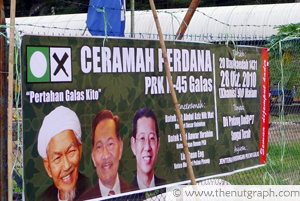
It’s something PR should learn, too. The PR penchant for banking on the star power of top leaders like Datuk Seri Anwar Ibrahim, Lim Kit Siang and Lim Guan Eng, failed to woo voters in Galas. Voters may have attended PR ceramahs to listen to national issues, but this did not necessarily translate to support for the young coalition nor did it answer their concerns about local bread-and-butter issues.
An added problem for PR is its weak foundation in rural constituencies compared to BN. There was a clear lack of PR local leadership and machinery in Gua Musang, notwithstanding the fact that PAS controls the state government.
Beyond the results: A disempowered electorate
Each of the 13 by-elections since 2008 have their unique political contexts. But one thing is a constant — the dishing out of by-election goodies which BN and PR are equally guilty of in principle, if not amount.
“This is a clear abuse of resources. Most of these goodies come from national resources which belong to the people, not the government,” Khoo tells The Nut Graph. The government, he adds, is entrusted by the people to manage these resources.
He fears the conditioning of voters to “surrender too much power to the politicians”. Khoo adds, “We need to move forward from this feudal system. [In a true democracy,] the people are the masters and the politicians the servants”.
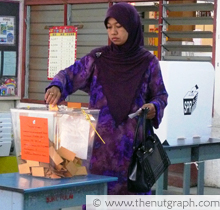
Apart from elections, there seems little else voters can do to advance their interests. Indeed, The Nut Graph observes from talking to some constituents in Galas that they feel limited in their ability to effect change other than by voting in elections every few years.
But who is educating the voters? Surely not the politicians, especially if they benefit from the status quo, Khoo notes.
PR’s fortunes are tied to the awakening of voters, Khoo believes, but it will find it difficult to compete with BN’s superior machinery and financial strength. Until the day political awareness is raised equally among all voters, the politics of development will largely shape the next elections. ![]()

